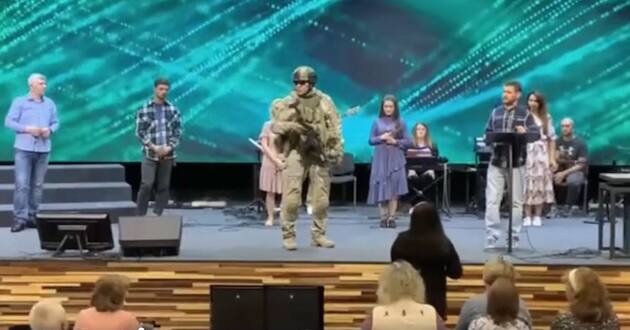Ukraine’s Evangelical Churches Endure War and Persecution

Ukraine, once considered the evangelical capital of Europe, has seen its religious landscape devastated since the Russian invasion. The World Evangelical Alliance estimated there were about 13,000 evangelical congregations in Ukraine as recently as 2022. But the ongoing war has left a trail of destruction: more than 600 churches and religious sites have been destroyed, including many evangelical congregations, according to UNESCO and reported by Metro Voice.
“In a basement somewhere in occupied Ukraine, Christians gather in whispers. Their church is gone now – one of hundreds destroyed since Russia’s war began,” Metro Voice reported, noting how fathers, including form evangelical families, have been called up.
UNESCO’s latest verification counts at least 145 religious buildings among 468 damaged cultural sites. Observers say President Vladimir Putin is systematically dismantling Ukraine’s diverse religious landscape—a landscape that once set Ukraine apart from its larger Russian neighbor.
Mainstream media takes notice of Evangelicals caught in war
As Time Magazine reports: “Evangelicals are targeted by the Russians disproportionally, and Azat’s story is typical for Russia’s systemic persecution of Protestants in occupied Ukraine. Protestants were the victims of 34 percent of the reported persecution events, and 48 percent in the Zaporizhzhia region where Azat was held. Baptists made up 13 percent of victims – the largest single group after Ukrainian Orthodox. Under Russian control 400 Baptist congregations have been lost, 17% of the total in Ukraine.”
“More than 400 drones hit Kyiv, Ukraine’s capital, recently in just one night,” said Eric Mock, senior vice president of ministry operations for Slavic Gospel Association (SGA). “The people there face death and destruction every day. Fear and anxiety are raging. Young women send their husbands off to the front, knowing they might never see them again. All of this is a huge test of their faith.”
The war’s toll is staggering, both on the battlefield and in the pews. An estimated 70,000 Ukrainian soldiers have died, many of them in their 20s and 30s. This number aligns with other recent reporting, such as Metro Voice’s coverage that “something is missing in many Ukrainian churches this Christmas season—the men, who either have died in the war or been mobilized to fight.” Pastors and church leaders are not exempt from conscription. As a result, hundreds of churches are left without male leadership, and congregations now largely consist of women, children, and the elderly.
“It’s so powerful,” Mock said. “They are keeping their faith when the world around them says ‘where is your God?’ I find their faith extremely humbling.” In many occupied areas, Christians have resorted to gathering in secret and meeting in small groups to avoid detection by Russian authorities. According to International Christian Concern’s 2025 Global Persecution Index, at least 43 pastors, priests, and Christian teachers have been kidnapped, murdered, or tortured in occupied Ukrainian territories.

The crackdown extends beyond Ukraine. Late last year, Russia’s parliament introduced legislation banning religious services in residential buildings, threatening the existence of house churches that have become lifelines for many believers. Jeff King, president of International Christian Concern, told Fox News Digital, “Russian authorities now target religious speech, literature, and missionary activities, branding them as ‘extremist’ to control and suppress non-Russian Orthodox Christian practices.”
In response to the crisis, the Slavic Gospel Association is ramping up Bible training for new pastoral recruits inside Ukraine. The group aims to equip 1,000 new Ukrainian missionary pastors within the next 12 months while supporting some 850 evangelical churches. “It’s the first time many of these young men have been in ministry,” Mock explained. “They’re speed-learning so that they’re ready to serve.”
Mock, a pastor himself, has preached at several evangelical churches in Ukraine that now lie in ruins. “It turns my stomach,” he said. “They’ve been wiped out.” Beyond training pastors, SGA supports the wives and widows of those serving at the front. “On one side, they’re steadfast, faithful women, stoically supporting their husbands who are often serving as chaplains on the frontline,” Mock said. “But the other side is an anxious, emotionally-fragile woman, living every moment in dread.”
International observers have noted the pattern of religious persecution in Ukraine mirrors Soviet-era crackdowns. “For those monitoring religious freedom globally, the parallels with Soviet-era persecution are clear,” writes Metro Voice. Putin’s government, backed by the Russian Orthodox Church, has been accused of providing the Kremlin with spiritual justification for its actions, further eroding religious plurality in the region.
The Slavic Gospel Association, which also supports churches and missionary pastors in Russia, Israel, and other former Soviet nations, is now at the forefront of the response. “Ukraine has been referred to as the ‘Bible Belt of Europe’,” said Michael Johnson, SGA’s president. “We’re seeing their faith being tested under the most stressful circumstances. It is a privilege to serve them.”
The implications of this crisis reach far beyond Ukraine’s borders. “In many authoritarian states, Christianity is seen as a proxy for Western influence and values, which regimes often reject as imperialistic or destabilizing,” King told Fox News Digital. “Christianity and other faiths emphasize allegiance to a higher moral authority, which inherently challenges authoritarian regimes that demand complete loyalty to the state.”
For more information, visit www.sga.org.
–Dwight Widaman | Metro Voice








